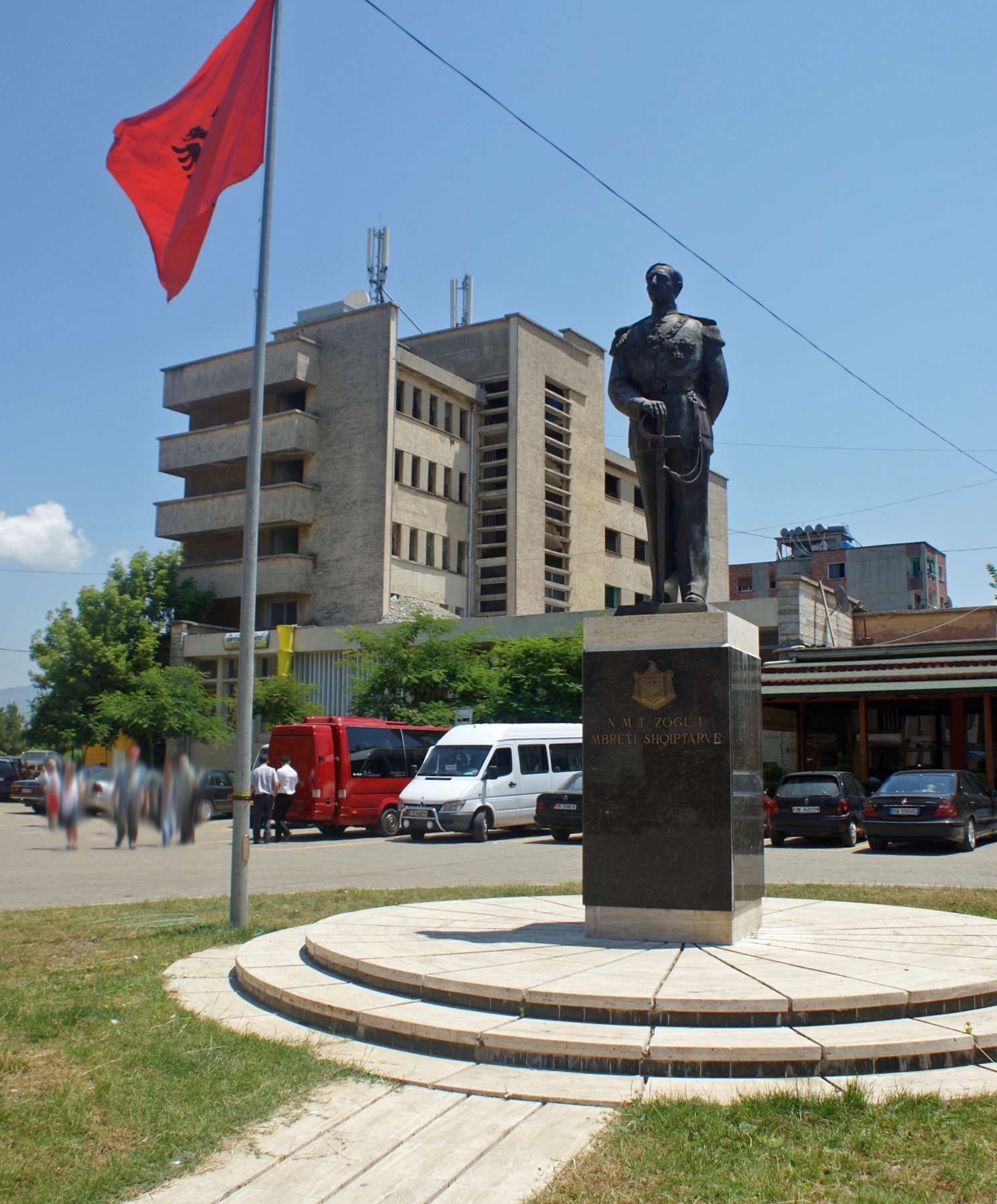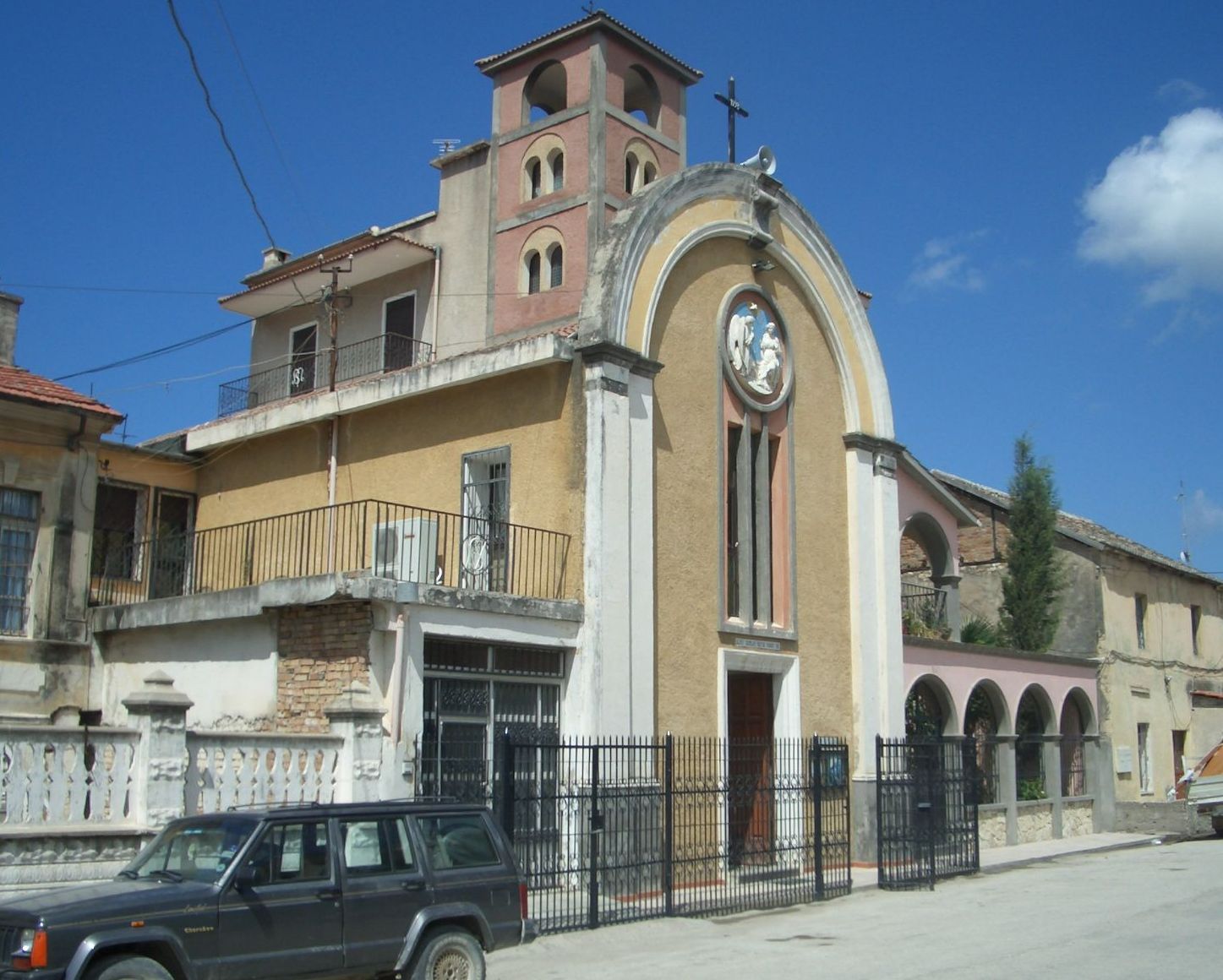|
Juliana Pasha
Juliana Pasha (born 20 May 1980) is an Albanian singer. In 2010, she won Honorary Citizen Award of Burrel from the mayor of the city. After she went into Eurovision in 2010 she won the first prize in the festival "Kenga Magjike" with the song called "Sa e shite zemren". She was a mentor and judge on the first series of Albania and Kosovo's version of The X Factor. Eurovision 2010 On 27 December 2009, Pasha won the national final to represent Albania in the Eurovision Song Contest 2010. She had previously taken part in the 2007 and 2008 festivals, placing 3rd and 2nd respectively with "Qielli i ri" and "Një jetë", the latter a duet with Luiz Ejlli. In the contest, she qualified to the final, where she performed fifteenth, following the Turkish representants MaNga and preceding Iceland's Hera Björk, and placed 16th out of 25 contestants, receiving 62 points, which included a 12-point set from Macedonia. Personal life Pasha has stated that she believes in God and that she b ... [...More Info...] [...Related Items...] OR: [Wikipedia] [Google] [Baidu] |
Burrel
Burrel (alternate forms ''Burrel'', ''Mat'') is a town in northern Albania, 91 km from Tirana. At the 2015 local government reform it became a subdivision and the seat of the municipality Mat, Albania, Mat. It was the seat of the former District of Mat. The population as of the 2023 census is 7,928. History The last archaeological researches has explored different trails which demonstrate the population of the area from the Paleolithic era. The valley of Mat (river), Mati, has been populated during all the historic periods. In antiquity the region was inhabited by various Illyrians, Illyrian populations including the Pirustae. In second century BC the region came under Roman Republic, Roman control. A famous native of Burrel was Ahmet Zogu, first King of the Albanians (born Ahmet Zogolli, later changed to Ahmet Zogu; 8 October 1895 – 9 April 1961), who reigned as King Zog I from 1928 to 1939. He had previously been a Prime Minister of Albania between 1922 and 1924 and Pres ... [...More Info...] [...Related Items...] OR: [Wikipedia] [Google] [Baidu] |
Albania In The Eurovision Song Contest
Albania has been represented at the Eurovision Song Contest 21 times since its debut in . The current Albanian participating broadcaster in the contest is (RTSH), which determines the country's entry every year through the national selection of Festivali i Këngës, a long-standing song competition organised yearly since 1962. Albanian debut in was successful, with " The Image of You" by Anjeza Shahini, placing 7th. It remained the country's best result until , when "" by Rona Nishliu finished 5th. The country also reached the top ten in , finishing eighth with "" by Shkodra Elektronike. Albania has participated every year since their debut and has participated in the final 12 out of 21 times. Participation (RTSH) is a full member of the European Broadcasting Union (EBU), thus eligible to participate in the Eurovision Song Contest. It has participated in the contest representing Albania since the country's debut in 2004. History 2000s ... [...More Info...] [...Related Items...] OR: [Wikipedia] [Google] [Baidu] |
Albanian Christians
Christianity in Albania began when Christians arrived in Illyria soon after the time of Jesus, with a bishop being appointed in Dyrrhachium ( Epidamnus) in 58 AD. When the Roman Empire was divided in 395 AD, modern Albania became part of the Byzantine Empire, but was under the jurisdiction of the Pope until 732, when Emperor Leo III placed the church under the Patriarch of Constantinople. When the Christian church split in 1054, the north followed Rome while the south of the country stayed with Constantinople. From 1100 AD, the Roman Empire carried out Church missions in the area. In relation to the increasing influence of Venice, the Franciscans started to settle down in the area in the 13th century. From the 15th century to the 19th century, under the rule of the Ottoman Empire, Christianity was replaced by Islam as the majority religion in Albania. Demographics Census in 2011 The 2011 population census, gives the percentages of religious affiliations with 58% Muslim, 10% ... [...More Info...] [...Related Items...] OR: [Wikipedia] [Google] [Baidu] |
People From Mat (municipality)
The term "the people" refers to the public or common mass of people of a polity. As such it is a concept of human rights law, international law as well as constitutional law, particularly used for claims of popular sovereignty. In contrast, a people is any plurality of persons considered as a whole. Used in politics and law, the term "a people" refers to the collective or community of an ethnic group or nation. Concepts Legal Chapter One, Article One of the Charter of the United Nations states that "peoples" have the right to self-determination. Though the mere status as peoples and the right to self-determination, as for example in the case of Indigenous peoples (''peoples'', as in all groups of indigenous people, not merely all indigenous persons as in ''indigenous people''), does not automatically provide for independent sovereignty and therefore secession. Indeed, judge Ivor Jennings identified the inherent problems in the right of "peoples" to self-determination, as i ... [...More Info...] [...Related Items...] OR: [Wikipedia] [Google] [Baidu] |
21st-century Albanian Women Singers
File:1st century collage.png, From top left, clockwise: Jesus is crucified by Roman authorities in Judaea (17th century painting). Four different men (Galba, Otho, Vitellius, and Vespasian) claim the title of Emperor within the span of a year; The Great Fire of Rome (18th-century painting) sees the destruction of two-thirds of the city, precipitating the empire's first persecution against Christians, who are blamed for the disaster; The Roman Colosseum is built and holds its inaugural games; Roman forces besiege Jerusalem during the First Jewish–Roman War (19th-century painting); The Trưng sisters lead a rebellion against the Chinese Han dynasty (anachronistic depiction); Boudica, queen of the British Iceni leads a rebellion against Rome (19th-century statue); Knife-shaped coin of the Xin dynasty., 335px rect 30 30 737 1077 Crucifixion of Jesus rect 767 30 1815 1077 Year of the Four Emperors rect 1846 30 3223 1077 Great Fire of Rome rect 30 1108 1106 2155 Boudican revolt ... [...More Info...] [...Related Items...] OR: [Wikipedia] [Google] [Baidu] |
Living People
Purpose: Because living persons may suffer personal harm from inappropriate information, we should watch their articles carefully. By adding an article to this category, it marks them with a notice about sources whenever someone tries to edit them, to remind them of WP:BLP (biographies of living persons) policy that these articles must maintain a neutral point of view, maintain factual accuracy, and be properly sourced. Recent changes to these articles are listed on Special:RecentChangesLinked/Living people. Organization: This category should not be sub-categorized. Entries are generally sorted by family name In many societies, a surname, family name, or last name is the mostly hereditary portion of one's personal name that indicates one's family. It is typically combined with a given name to form the full name of a person, although several give .... Maintenance: Individuals of advanced age (over 90), for whom there has been no new documentation in the last ten ... [...More Info...] [...Related Items...] OR: [Wikipedia] [Google] [Baidu] |
1980 Births
__NOTOC__ Year 198 (CXCVIII) was a common year starting on Sunday of the Julian calendar. At the time, it was known as the Year of the Consulship of Sergius and Gallus (or, less frequently, year 951 ''Ab urbe condita''). The denomination 198 for this year has been used since the early medieval period, when the Anno Domini calendar era became the prevalent method in Europe for naming years. Events By place Roman Empire * January 28 ** Publius Septimius Geta, son of Septimius Severus, receives the title of Caesar. **Caracalla, son of Septimius Severus, is given the title of Augustus. China *Winter – Battle of Xiapi: The allied armies led by Cao Cao and Liu Bei defeat Lü Bu; afterward Cao Cao has him executed. By topic Religion * Marcus I succeeds Olympianus as Patriarch of Constantinople (until 211). Births * Lu Kai, Chinese official and general (d. 269) * Quan Cong, Chinese general and advisor (d. 249) Deaths * Li Jue, Chinese warlord and ... [...More Info...] [...Related Items...] OR: [Wikipedia] [Google] [Baidu] |
Aurela Gaçe
Aurela Gaçe (; born 16 October 1974) is an Albanian singer-songwriter, actress and television personality. Her music career made her to be called as the diva of South Albania. Awards A three-time Festivali i Këngës winner, a three-time Kënga Magjike winner and a two-time Balkan Music Award winner for ''Balkan's Song of the Year'' and ''Best Singer from Albania''. She was a judge on the third season of '' The Voice of Albania''. In 2010, she won the 49th edition of Festivali i Këngës with the song " Kënga ime" and represented Albania in the Eurovision Song Contest 2011 held in Düsseldorf, Germany. Life and career Aurela Gaçe was born on 16 October 1974 into an Albanian family in the village of Llakatund, Vlorë, then part of the People's Socialist Republic, present Albania. In 2010 Gaçe won the 49th edition of " Festivali i Këngës" with "Kënga Ime", written by Shpëtim Saraçi. Her most successful song ''Origjinale'' (feat. Dr. Flori & Marsel) has more ... [...More Info...] [...Related Items...] OR: [Wikipedia] [Google] [Baidu] |
Eurovision Song Contest 2010
The Eurovision Song Contest 2010 was the 55th edition of the Eurovision Song Contest. It took place in Oslo, Norway, following the country's victory at the with the song "Fairytale (Alexander Rybak song), Fairytale" by Alexander Rybak. Organised by the European Broadcasting Union (EBU) and host broadcaster (NRK), the contest was held at the Telenor Arena, and consisted of two semi-finals on 25 and 27 May, and a final on 29 May 2010, tying with the for the contest hosted the latest. The three live shows were presented by Norwegian television presenters Erik Solbakken and Nadia Hasnaoui and singer Haddy N'jie. Thirty-nine countries took part in the contest, with returning after its one-year absence. Meanwhile, , the , , and ceased their participation, mainly for reasons related to the 2008 financial crisis. originally announced its non-participation, but was later confirmed by the EBU among the participants. The winner was with the song "Satellite (Lena Meyer-Landrut song), ... [...More Info...] [...Related Items...] OR: [Wikipedia] [Google] [Baidu] |
Carry Me In Your Dreams
"Carry Me in Your Dreams" is a song by Albanian singer Kejsi Tola, independently released as a single in 2008. It was written by Agim Doçi and composed by Edmond Zhulali. Musically, it is an English-language uptempo pop song, inspired by folk music and 1970s French pop. Its lyrics are a declaration of love by singing someone else's praise and also focuses on the longing between two separated people. "Carry Me in Your Dreams" represented in the Eurovision Song Contest 2009 in Moscow, Russia, after Tola won the country's pre-selection competition, Festivali i Këngës 47, with the Albanian-language version "Më merr në ëndërr". The country reached the 17th place in a field of 25, gaining a total of 48 points. During her Cirque du Soleil-described show of the song, she was performing against slightly dark-coloured LED screens and was accompanied by three dancers and two backing vocalists. Background and composition In 2008, Kejsi Tola was announced as one of the twenty co ... [...More Info...] [...Related Items...] OR: [Wikipedia] [Google] [Baidu] |

